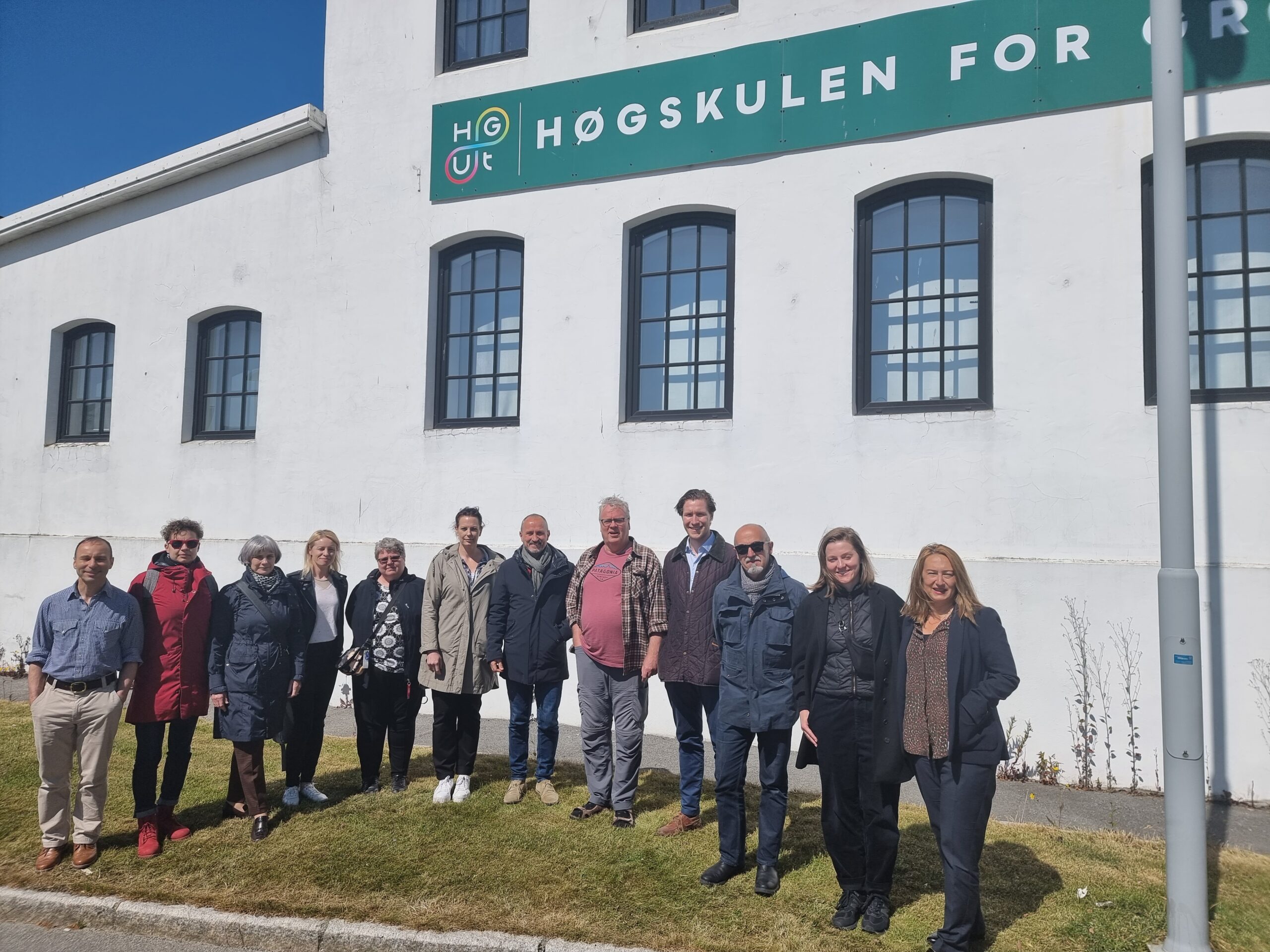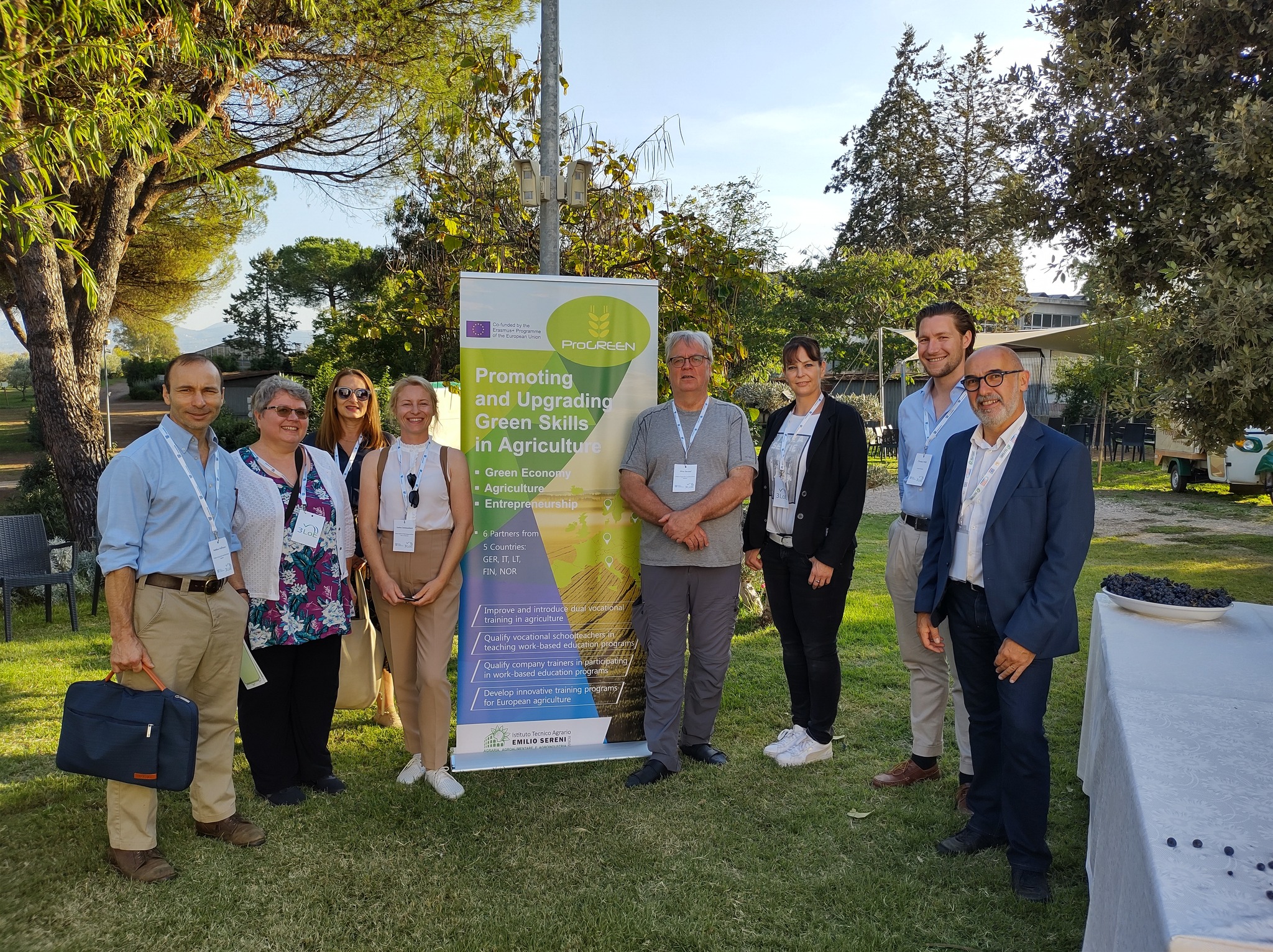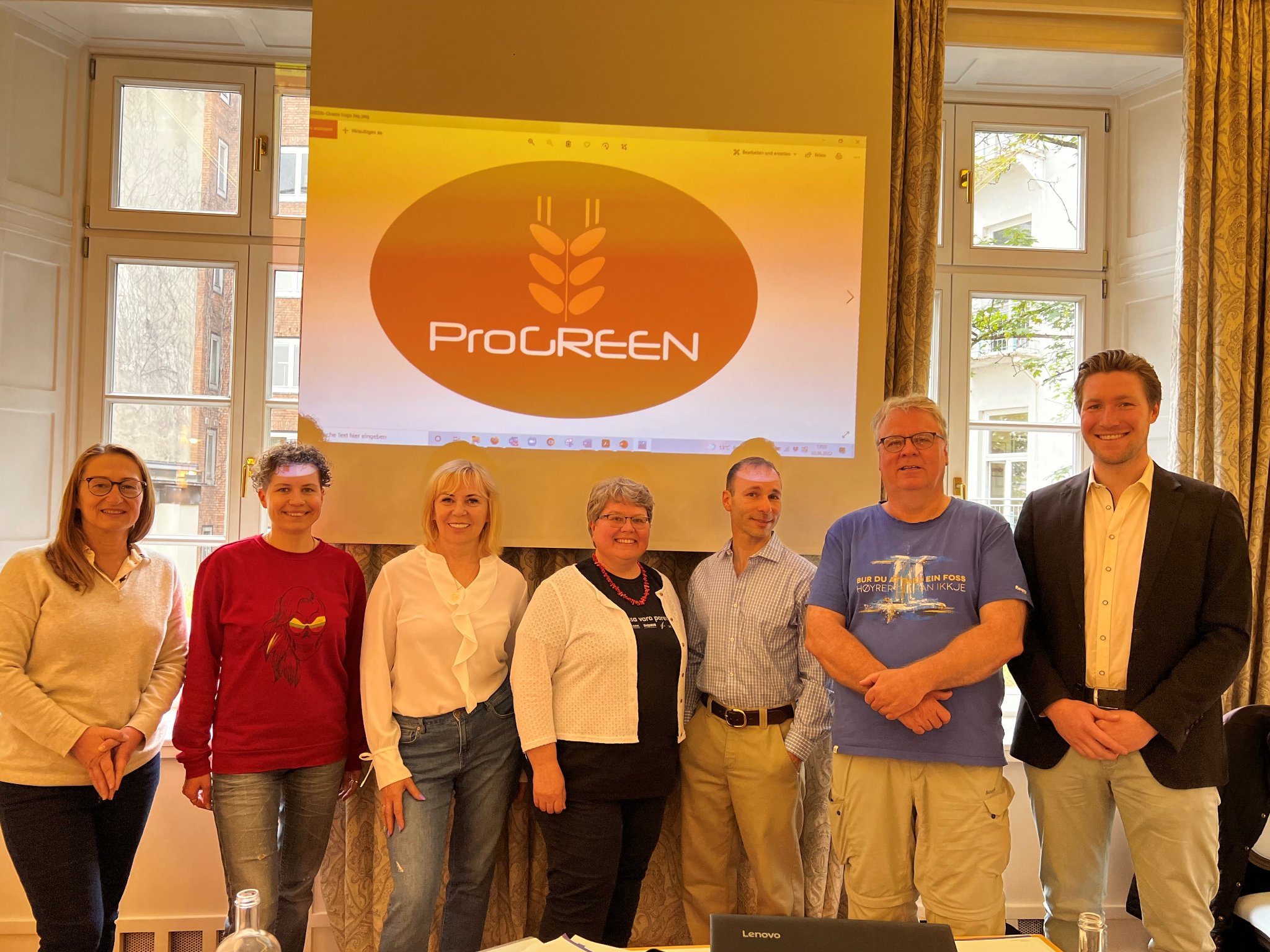News Timeline 4
-
May 2024
ProGREEN consortium meets in Hamburg: Progress in the education revolution for European agriculture

On the 23.Mai.2024, the ProGREEN consortium gathered in Hamburg for a pivotal transnational project meeting. We're thrilled to share the advancements we're making in our mission to revolutionize European agriculture through education. Our efforts have led to the development and implementation of several key training programs: Two initial vocational training programs for farmers to provide foundational skills. A training program for instructors to ensure effective teaching. A training program for educational staff to support comprehensive learning environments. Two advanced training programs focused on ecological agriculture and sustainable agricultural entrepreneurship to promote forward-thinking farming practices. Our goal is clear: equip farmers with the skills necessary to navigate the critical transformation in European agriculture. This includes reducing CO2 emissions, preserving biodiversity, and ensuring the careful use of soil, air, and water. These educational initiatives aim to meet the pressing demands from politicians, nature conservation groups, and citizen initiatives. Farmers today need to stay competitive, produce high-quality food, and fulfill important social roles such as promoting inclusion and strengthening local networks. However, there are significant challenges. According to the European Parliament, only 8.5% of farmers currently possess the necessary skills and qualifications. Moreover, the farming community is ageing, with just 11% under the age of 40 and a third over 65. This highlights the urgent need for educational programs like ours to rejuvenate and empower the agricultural sector. During our meeting, we had the privilege of visiting two exemplary farms in Hamburg. These farms are leading the way in species-appropriate animal husbandry, aligning ecology with economy, and showcasing innovative business models. Together, we are working towards a sustainable and prosperous future for European agriculture. With ProGREEN's educational initiatives, we are confident that we can equip farmers with the skills needed to embrace these changes and ensure the sustainability of agriculture in Europe. This transformation is not just about meeting environmental goals but also about ensuring the economic viability and social responsibility of farming communities. Let's continue to support and expand these efforts, working hand in hand for a greener, more sustainable future in agriculture.
-
June 2023
Meeting in Bryne

The Promoting and Upgrading Green Skills in Agriculture (ProGreen) project group met in the south-western corner of Norway at Høgskulen for grøn utvikling on Bryne in early June 2023 to continue development work and discussions on the needed changes in agricultural vocational education. Christian Wildt from Hansa Parliament in Hamburg, Germany, presented and led a discussion on new trends in agriculture. In the agricultural sector, agrophotovoltaic systems are emerging. This system involves installing solar panels above agricultural fields. You have the option to install them horizontally at a height of 5 meters above the fields or vertically across the fields. The vertical solar panels can produce energy on both the front and back sides of the panel, increasing energy production by 160–190%. You can space the vertical panels 8–10 meters apart and also use them as fences. The panels provide shade for both crops and animals during grazing, such as in chicken keeping. Tests of these systems have taken place in India, Italy, and Germany, among others. However, operating machinery between the solar panel structures can be challenging, and there may also be issues with agricultural support. Nadine Eckhoff from the Chamber of Agriculture in Hamburg points out that it is important not to fill up good agricultural land with solar panels, but to find a suitable balance in these new solutions. Another emerging trend is the use of carbon farming to trade humus certificates. Carbon farming is an agricultural practice aiming to sequester carbon dioxide from the atmosphere and store it in the soil. Humus certificates are a mechanism that incentives and rewards farmers for their effort in building soil carbon and sequestering carbon dioxide. Humus is the basis for soil fertility. According to the Thünen Institute, humus-forming measures such as additional cultivation of catch crops or the establishment of agroforestry systems in Germany could, in the best-case scenario, bind an additional five million metric tonnes of CO2 as soil carbon in the field each year. Farmers can increase the humus content in their soil by using CO2 certificates, also known as humus certificates, to reward humus enrichment. The farmer signs a contract with specialised certification companies for an agreed period of time (for example, 10 years). As a result, they commit themselves to increasing the humus content of their soil with regenerative measures. Regenerative methods include, for example, extending crop rotation, reducing tillage, growing catch or cover crops, and growing perennial crops like clover grass. At the end of the contract period, the companies measure and certify the actual CO2 sequestration implemented on the field, and subsequently pay the farm a premium for this service. Some certifiers use scientific studies to calculate carbon sequestration for specific measures rather than relying on measurements. This means that there is no additional cost for soil samples. The certifiers then resell the certificates for the respective CO2 sequestrations to companies that want to offset their own greenhouse gas emissions. The Humus certificates have also been subject to significant criticism. Since carbon sequestration is reversible, there is no long-term guarantee. For years, subsidy programs have financially supported certain humus buildup measures. Transporting plant mass from one area of the farm to another creates a shifting effect that contributes to humus buildup. One can also argue that this system lacks fairness, as many organic farms have already been building up humuse for decades. Annika Michelson, lecturer at HÄMe University of Applied Sciences
-
November 2022
Facing new challenges in the field of agricultural vocational education

Global agriculture is facing significant challenges. We expect farmers to generate sustainable incomes, enhance their competitiveness, produce high-quality food, and simultaneously assume important social functions like inclusion and local network development. In order to be able to adapt to climate change and halt loss of biodiversity, the agricultural sector seeks methods to transform into regenerative use of natural resources. How can we then develop vocational education to meet society's needs? Istituto Tecnico Agrario Emilio Sereni is located near Rome, Italy. This vocational agricultural institute has a 35-hectare educational farm consisting of vineyards, olivegroves, orchards, arable land, artichoke fields, experimental fields, and greenhouses. There are also processing units for wine and oil. All productions are organic. The educational farm primarily produces wine, oil, honey, and ornamental plants, which the institute directly sells. Students at Istituto Tecnico Agrario Emilio Sereni in Rome present their educational institutions for guests. As part of their practical training, the school's students work at the farm on a daily basis. They also participate in pruning, harvesting grapes and olives, growing ornamental plants, making wine, and collecting and processing honey. There are also experimental field trials of vegetable crops at the farm. Italian farms are relatively small, typically spanning about 6 ha in the central region of Italy. While the farms do not require farm workers, they are modernising the agricultural food sector by implementing new technological solutions and expanding their teaching methods to include marketing. In recent years, HAMK has integrated agricultural vocational education into our educational farm work, following the model of Istituto Tecnico Agrario Emilio Sereni. Agrario Emilio Sereni. To provide students with authentic tasks, real farm data is required. AConsequently, Mustiala has developed an open-access documentation of its educational and research farm activities and processes, available at www.mustialanluomutila.fi.This is significant because fewer students come from farming backgrounds, necessitating safe practice before granting them the freedom to participate independently in private farm activities. Modern greenhouses use hydroponic growing systems. One can carry out greenhouse cultivation either by using substrates and growing in pots or by solely using liquid medium. Substrates can be rockwool, perlite, pumice, or natural materials such as peat, pomace, or coconut fibers. Long drought periods in the Mediterranean area drive the development of microorganic irrigation systems, providing a more efficient way to use water resources. Italy cultivates tomatoes, peppers, cucumbers, gerberas, and roses using rowing systems. In the liquid growing system, plants are floating on a larger amount of water. This system is better for fast growing plants with large leaves, such as salats and spinach. Such systems can alsUrban areas can establish such systems, which require less land resources compared to traditional methods. l It may also be possible to grow medicinal plants in these modern environments. Alanta School of Technology and Business in south-eastern Lithuania is working on developing a new study program for practically gifted students and students with learning difficulties. Finding suitable farm practice places for practically gifted students and students with learning difficulties is a challenging task. For several years, the HAMK Mustiala educational and research farm has used drones to monitor fields. The educational farm at Alanta School of Technology and Business also mandates the use of drones for monitoring purposes. However, they both confront the same challenge: how can we utilise the drone data for farm management? At HAMK, biochar has been the focus of several projects. Nummilohko added biochar in 2020, but it will take some time to observe its effects. Alanta School of Technology and Business in Lithuania is also interested in biochar, and they participate in a new project on producing biochar out of princess trees (Paulownia tomentosa). In Germany, there is a need for educating farm workers at larger agricultural enterprises in using more green methods according to the European Green Deal and United Nations Sustainability Goals. For this purpose, we have developed two additional training courses: Sustainable Agricultural Entrepreneur is developed by Høgskulen for grøn udvikling in Norway and Modern Ecological Agriculture by Häme University of Applied Sciences. Annika Michelson, lecturer at HÄMe University of Applied Sciences
-
October 2022
meeting at the Istituto Tecnico Agrario Emilio Sereni in Rome

On October 2022, we had our second ProGREEN transnational project meeting at the Istituto Tecnico Agrario Emilio Sereni in Rome. After an interesting visit of the school's experimental fields, we discussed the development of two initial vocational training programs, one company trainer program, one train the trainer program and two further training programs. All programs have the goal of helping farms to reach the Common agricultural policy targets (CAP) for the period 2023-2027, focusing on ecological farming to preserve our biodiversity, soil, water, air and to mitigate the effects of climate change.
-
June 2022
Discussion in Hamburg

On June 2022, the ProGREEN project consortium met in Hamburg to discuss the upcoming educational product's development work. Within the ProGREEN project, initial dual vocational education will be promoted, company trainers and school teachers will be trained to work in the dual vocational training system and two further educational programs will be designed according to the latest ecological standards, focusing providing guidance on holistic agriculture. The agricultural sector is decisive in conserving biodiversity, slowing down climate change and providing health food for all citizens. We aim at supporting the ongoing transformative processes by improving qualifications, knowledge and further education possibilities of farmers in the EU.
-
April 2022
New Projekt Start: ProGREEN
𝐍𝐞𝐰 𝐏𝐫𝐨𝐣𝐞𝐜𝐭 𝐀𝐥𝐞𝐫𝐭!! ProGREEN - Promoting and Upgrading Green Skills in Agriculture European agriculture is facing a significant transformation. Reduction of CO2 emissions, preservation of biodiversity, careful use of soil, air and water are just some demands made by politicians, nature conservation associations and citizens’ initiatives. At the same time, farmers are expected to generate sustainable incomes, increase their competitiveness, produce high-quality food and, to take on important social functions such as inclusion and the development of local networks. This means that the substantive ecological transformation must be accompanied by a personnel one. But there is a lack of important qualifications for this, as only 8.5% of farmers have a comprehensive education. Also, the current generation of European farmers is severely over-aged, with only 11% younger than 40 and a third over 65. The ProGREEN project will contribute to better agricultural qualifications with the development, testing and permanent implementation of a set of different educational products. Ecology through economy is the conviction that characterizes the consortium and this project. Ecological measures are only sustainable if they also make business sense for the individual farmer.
